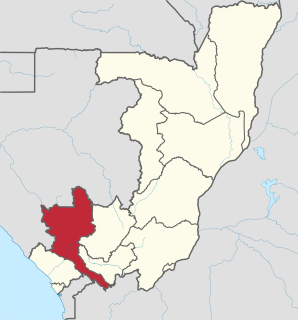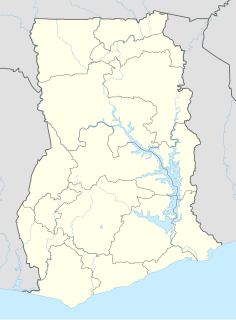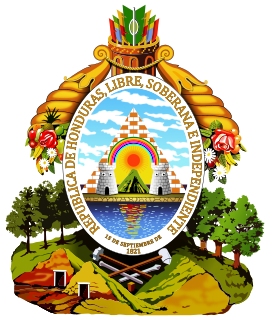
Niari is a department of the Republic of the Congo in the western part of the country. It borders the departments of Bouenza, Kouilou, and Lékoumou, and internationally, Gabon, the Democratic Republic of the Congo, and the Cabinda portion of Angola. The regional capital is Dolisie.
An inland port is a port on an inland waterway, such as a river, lake, or canal, which may or may not be connected to the sea. The term "inland port" is also used to refer to a dry port, which is an inland extension of a seaport, usually connected by rail to the docks. This article covers only ports that are covered by the first definition.

Sampa is a town in the Bono Region of Ghana, on the border with Côte d'Ivoire. It is the capital of Jaman North Municipal, and was formerly the site of a Slave market. It was also the capital of the Akan State of Gyaaman in the late 15th century. It is the biggest border town in Ghana with a population of over 36,000. It is the principal town of the Nafana ethnic group. They speak the Nafaanra language. They equally speak Twi because Sampa is a cosmopolitan society. Nafaanra is also spoken in Banda District, parts of Tain District and Bondoukou District of Cote d'Ivoire. The major cash crop produced by the people is Cashew. It is the leading producer of Cashew in Ghana.

The Banda people are an ethnic group of the Central African Republic. They are also found in the Democratic Republic of the Congo, Cameroon, and South Sudan. They were severely affected by slave raids of the 19th century and slave trading out of Africa. Under French colonial rule, most converted to Christianity but retained elements of their traditional religious systems and values.
The individual member states of the African Union (AU) coordinate foreign policy through this agency, in addition to conducting their own international relations on a state-by-state basis. The AU represents the interests of African peoples at large in intergovernmental organizations (IGO's); for instance, it is a permanent observer at the United Nations' General Assembly.

The Departments of the Republic of the Congo are divided into 86 districts and 6 communes. Note the departments of Brazzaville and Pointe-Noire are made of 1 commune each, then divided in urban districts (arrondissements).
Banda is a family of Ubangian languages spoken by the Banda people of Central Africa. Banda languages are distributed in the Central African Republic, Democratic Republic of the Congo, and South Sudan.

The chestnut-winged starling is a species of starling in the family Sturnidae. It is found in Angola, Benin, Cameroon, Central African Republic, Republic of the Congo, Democratic Republic of the Congo, Ivory Coast, Equatorial Guinea, Gabon, Ghana, Guinea, Liberia, Nigeria, São Tomé and Príncipe, Sierra Leone, South Sudan Sudan, Tanzania, Togo, and Uganda. It also found in Kolkata India

The Kwame Nkrumah Mausoleum and memorial park is located in downtown Accra, the capital of Ghana.
The International Tropical Timber Agreement (ITTA), 1983) is an agreement to provide an effective framework for cooperation between tropical timber producers and consumers and to encourage the development of national policies aimed at sustainable utilization and conservation of tropical forests and their genetic resources. The International Tropical Timber Organization was established under this agreement, which first opened for signature on November 18, 1983, then Entered into force on April 1, 1985. There were subsequent treaties, with an increasing number of signatories, in 1994 (ITTA2) and 2006 (ITTA3).
South Banda is a dialect continuum of the Banda languages spoken by around 200,000 or so people, primarily in the Central African Republic but with ten thousand or so in the Democratic Republic of the Congo. The two varieties may be mutually intelligible.

Pentila pauli, the Paul's buff, Paul's pentila or spotted pentila, is a butterfly in the family Lycaenidae. It is found in Senegal, Guinea, Sierra Leone, Liberia, Ivory Coast, Ghana, Togo, Benin, Nigeria, Cameroon, Gabon, the Republic of the Congo, the Central African Republic, Sudan, the Democratic Republic of the Congo, Angola, Uganda, Ethiopia, Kenya, Tanzania, Zambia, Malawi and Zimbabwe. The habitat consists of deciduous woodland and forest margins.

Visitors to Honduras must obtain a visa from one of the Honduran diplomatic missions unless they come from one of the visa exempt countries. All visitors must hold a passport valid for 3 months.

Banda Ahenkro is a town located in the west-northern of Bono region, Ghana. Its geography provided a home for numerous groups seeking shelter from across West Africa during the slave trade era. The original name of the settlement was Serminakuu meaning groups of 'grasses'. This name was changed to Banda, which is a corruption of 'Woanda' meaning 'they did not sleep'. Ancestors of Banda Ahenkro were allies of the Asante kingdom during wars and they provided a military force that virtually refused to sleep during at-war times. This is because they were predominantly Muslims and were found praying throughout the night. Later, 'woanda' was also corrupted by the Bono neighbours to become Banda. The settlement evolved to become the chief town or 'Ahenkro' within a collection of Nafana communities.

The Banda District is one of the Forty-six (46) new districts and municipalities created in the year 2012 in the Bono region of Ghana. Its capital is Banda Ahenkro.
Banda is a district in the Niari Department of Republic of the Congo.






